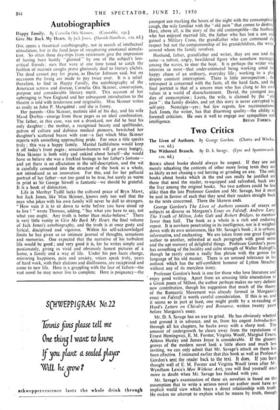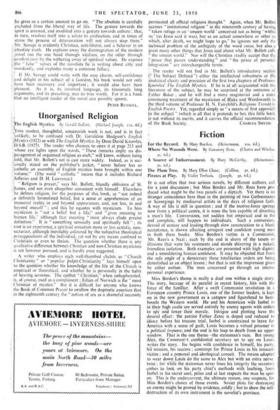Two Critics
BOOKS about books should always be suspect. If they are not merely rehashing the contents of other more living texts they are as likely as not chasing a red herring or grinding an axe. The only books about books which in the end can really be justified are those that send the reader, re-equipped and refreshed, back into the fray among the original books. No two authors could be less alike than the late Professor Gordon and Mr. Savage, but it must be said in favour of each that they send their readers straight back to the texts concerned. There the likeness ends.
George Gordon's The Lives of Authors consists of essays on subjects as diverse as Morgann's Essay on Falstaff, Andrew Lang. The Youth of Milton, John Galt and Robert Bridges, to mention fewer than half. The book as a whole is a rich and enduring repast. It is nowhere penetrating in its intelligence, nor is it weighed down with its own seriousness, like Mr. Savage's book ; it is urbane, informative, and enchanting. We are taken from one great English author to another, refreshed at each ,paragraph with good sense and the apt memory of delightful things. Professor Gordon's prose has something of the lucidity and calm strength of Walter Raleigh's, though he rarely coins a really fine phrase with the genius for language of his old master. There is an amused tolerance in his outlook which has the self-confident humour of Lytton Strachey without any of its merciless irony.
Professor Gordon's book is one for those who love literature and enjoy good writing. Apart from an amusing little emendation to a Greek poem of Milton, the author perhaps makes no very definite new contribution, though his suggestion that much of the theory of the Romantic Movement was already formed in Morgann's essay on Falstaff is worth careful consideration. If this is so, and it seems so in part at least, one might profit by a re-reading of Hurd's Letters on Chivalry and Romance, written twenty years before Morgann's essay.
Mr. D. S. Savage has an axe to grind. He has obviously whetted and ground it in advance, and so, from his cogent Introduction through all his chapters, he hacks away with a sharp tool. The amount of undergrowth he clears away from the reputations of Ernest Hemingway, E. M. Forster, Virginia Woolf, Margiad Evans, Aldous Huxley and James Joyce is considerable. If the gloomy groves of the modern novel look a little shorn and much less inviting, we can only admit that Mr. Savage's attack on them has been effective. I intimated earlier that This book as well as Professor Gordon's sent the reader back to the text. It does. If you have thought well of E. M. Forster and Virginia Woolf (even after Mr. Wyndham Lewis's Men WithOut Art), you will find yourself once more in doubt when Mr. Savage has finished with you.
Mr. Savage's examination of these six novelists is based on the assumption that to write a serious novel an author must have an implicit world view which bears a direct relationship with truth. He makes no attempt to explain what he means by truth, though he gives us a certain amount to go on. "The absolute is carefully Fxcluded from the liberal way of life. The gesture towards the spirit is arrested, and modified into a gesture towards culture ; that, in turn, resolves itself into a salute to civilisation, and in times of stress the process of deterioration will not always stop there." i Mr. Savage is evidently Christian, anti-liberal, and a believer in an iilbsolute truth. He explains away the disintegration of the modern i ;novel (on the one hand through vitalism, on the .other through !the" false " values of the novelists he is writing about ably and aestheticism) by the withering away of spiritual values. He exposes mordantly, and explodes many a common fallacy. I If Mr. Savage could write with the easy charm, self-confidence and delight in his subject of a Gordon, his book would not only have been necessary and important ; it would also have been i Pleasant. As it is, its involved language, its tiresomely long arguments, and its preaching, mar its true worth. For it is a book that no intelligent reader of the novel can possibly ignore.
PETER RUSSELL.



































 Previous page
Previous page